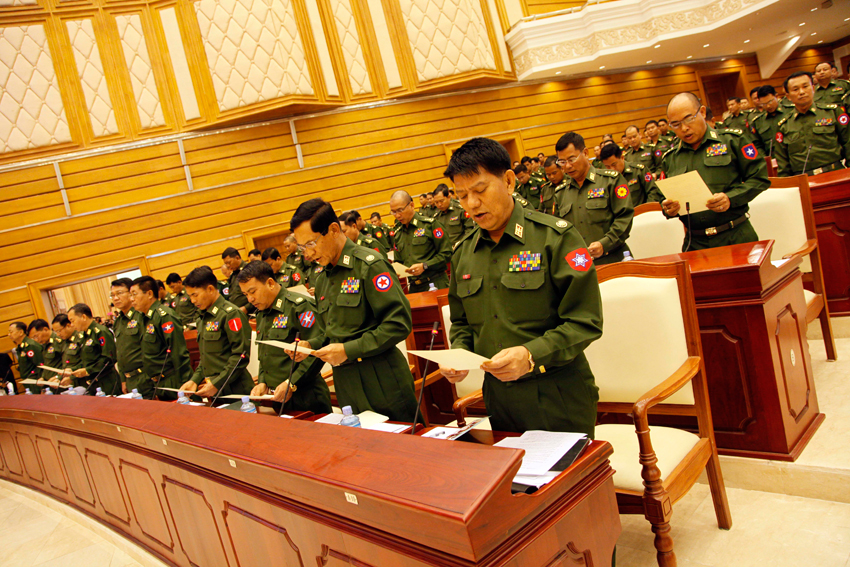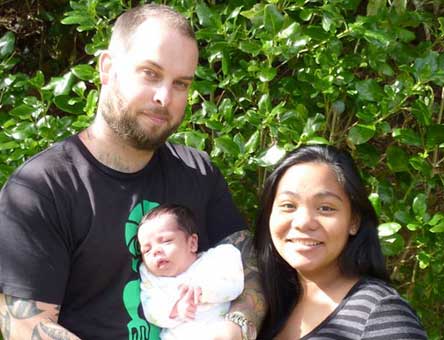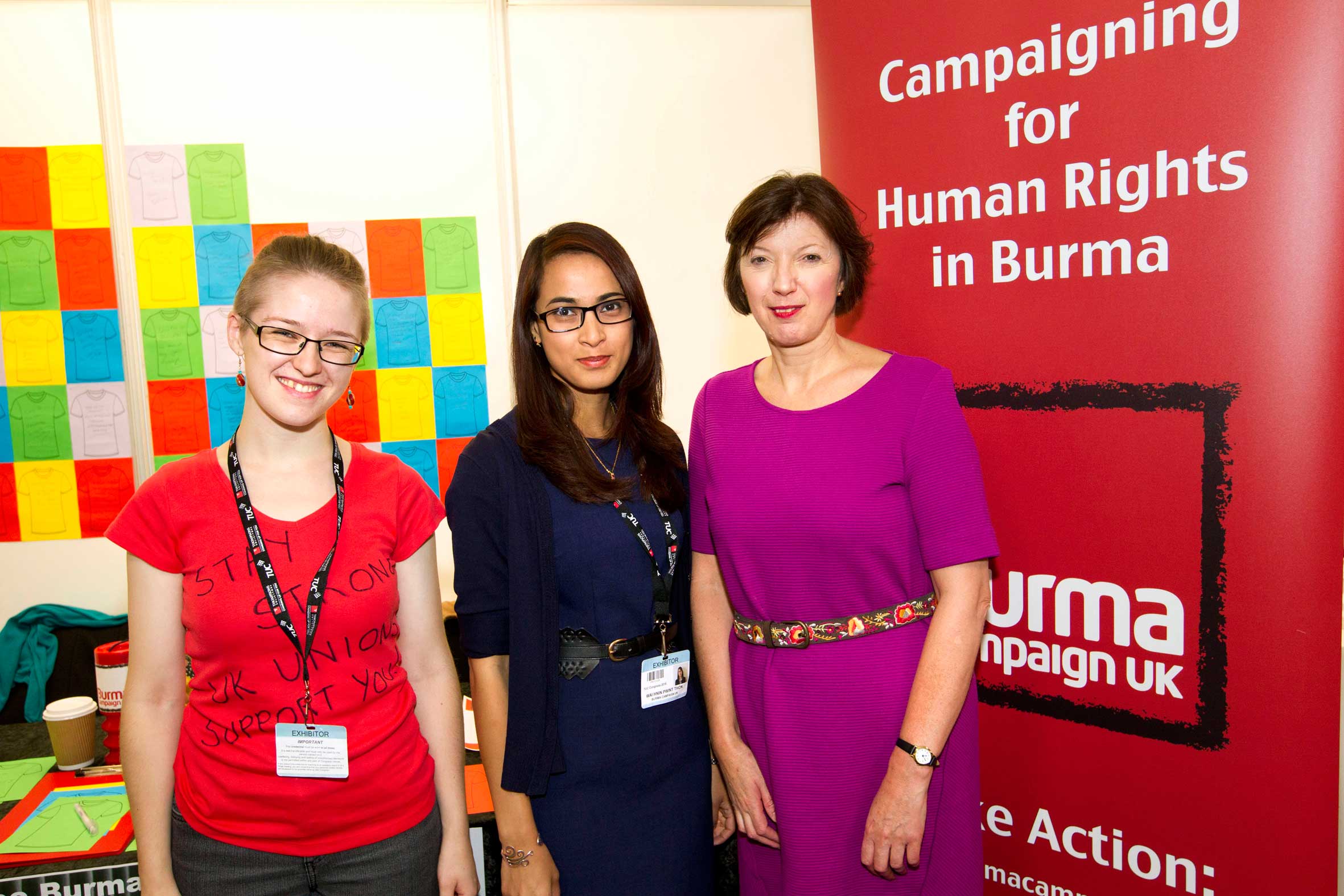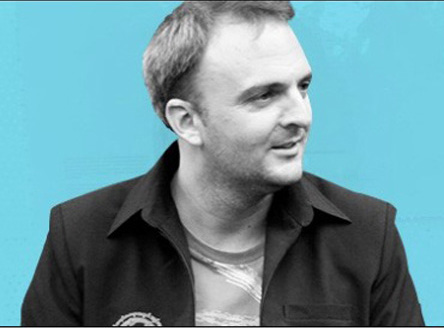New election Briefing Paper – Constitution ensures continued military control
Elections in Burma are scheduled for 8 November. Our new briefing paper looks at what is likely to happen after election day, the process of the elections, and key election statistics.
You can download the brieing here.
Key points from the briefing include:
- Regardless of who wins the election, the military has control and/or influence over every level of government and will still have ultimate control over the country.
- An NLD government could be powerless to stop many human rights violations as they will not have control over the armed forces, police, or security services. As a result, attacks against ethnic groups, use of rape as a weapon of war, and the arrest and jailing of critics of the military, could continue under an NLD government.
- For the first time since independence, ethnic Rohingya are largely unable to vote and will not have an MP in Parliament.
- For the first time since independence, Parliament is unlikely to contain a single Muslim MP.
- At least 20% of the population of Burma, more than 10 million people, have been deliberately disenfranchised or are unable to vote for other reasons.
- The elections will not bring Burma closer to addressing key issues relating to ethnic aspirations and rights.
- Neither the NLD or USDP are likely to ensure ethnic Rohingya have the rights and protection they are entitled to under international law, and external pressure will be required whoever forms the next government.
- Even before a single vote was cast, the elections cannot be either free, fair, credible or inclusive.
- The 2008 Constitution is designed for the eventuality of an NLD government without it being a threat to military interests.
- The election results are likely to highlight growing ethnic and religious divides in Burma.
- The election may usher in a government which is chosen by the people and able to implement policies and laws which benefit many people, despite being hamstrung on many issues.
- The election is also a key moment in the transition to a new form of military control and may consolidate continuing military control over the country.
- Victims of ongoing human rights violations cannot wait for a decades-long slow transition to a genuine democracy.
Caterpillar Disputes Illicit Jade Ties, Says ‘Robust Screening’ Used
An article in The Irrawaddy about a detailed report released by Global Witness on Friday, which alleged widespread corruption in Burma’s multibillion dollar jade trade at the behest of the military, senior figures from the former junta and individuals connected to the drug trade.
Mark Farmaner, from Burma Campaign UK, is quoted:
“British Burma policy is such a mess that frontmen for dodgy drug dealers are free to visit the UK,” he told The Irrawaddy. “Unlike the USA, they have no list of people in Burma linked with crime and human rights violations who are barred from the country, or who British companies are barred from doing business with.”
British political prisoner Philip Blackwood’s case reported in The Guardian and Telegraph
The Guardian reports:
Malnourished British prisoner suffering ‘awful’ conditions in Myanmar jail
A British man held in Myanmar’s most notorious jail is wasting away in a tiny cell with no window and an open sewer for a toilet while the British government is ignoring pleas to intervene, his father has told the Guardian.
The family has also been working with the Burma Campaign UK charity which accused foreign office minister Hugo Swire this week of abandoning Blackwood’s case by refusing to call for his release during a recent visit to Yangon.
Mark Farmaner, director of Burma Campaign UK, said: “Hugo Swire seems prepared to let an innocent British citizen and his colleagues rot in a Burmese jail rather than risk upsetting his new friends in the Burmese regime.”
And The Telegraph:
Briton jailed in Burma for ‘insulting’ Buddha image named prisoner of conscience by Amnesty
A British bar manager jailed in a notorious Rangoon prison for insulting Buddhism is to be named as a prisoner of conscience by Amnesty International as his family and human rights activists campaign for his release.
Burma Campaign UK, an activist group, this week described Mr Blackwood as a political prisoner and accused Hugo Swire, the foreign minister for Asia, of abandoning him to “rot” in Insein rather than risk British interests by pressing his plight with Burma.
You can take action to help free Philip Blackwood and all political prisoners in Burma here.
Blackwood ‘malnourished, suffering mental stress’
An article in DVB about the case of Philip Blackwood:
“Phil Blackwood, a bar-restaurant manager who has been incarcerated in Rangoon’s Insein Prison for nearly ten months, is malnourished and suffering from mental stress, according to his parents in Wellington, New Zealand.
Speaking to DVB this week, Brian and Angela Blackwood said, “Philip had lost over 20 kilogrammes when we saw him in late May/early June, and this weight loss has continued. He has now lost 30 to 35 kg.
“It was obvious then that his mental state was an issue even though he tried to hide it from us. Philip is trying to put on a brave face regarding his health so as not to worry his loved ones. This does not, however, disguise the fact that he is malnourished and suffering a great deal of mental stress. He is taking anti-depressants to get by.”
On 5 October, Burma Campaign UK released a statement accusing Foreign Office Minister Hugo Swire of “failing in one of his most fundamental duties – the support and protection of British citizens overseas.”
“When Foreign Office Minister Hugo Swire visited Burma a few weeks ago, and met with Burmese government officials, he didn’t even call for the release of Philip Blackwood or the other two political prisoners in this case,” the statement said.
“The Foreign Office is trying to treat this as a lower level consular case, rather than a political case where ministers must intervene. They are also trying to hide behind Philip’s dual nationality, saying consular arrangements have to be made with New Zealand. This is a red herring, as this should not be treated as simply a consular case. There is no justice or rule of law in Burma.”
Burma Campaign UK has launched an online petition calling for the release of Phil Blackwood and his Burmese colleagues Tun Thurein and Htut Ko Ko Lwin.”
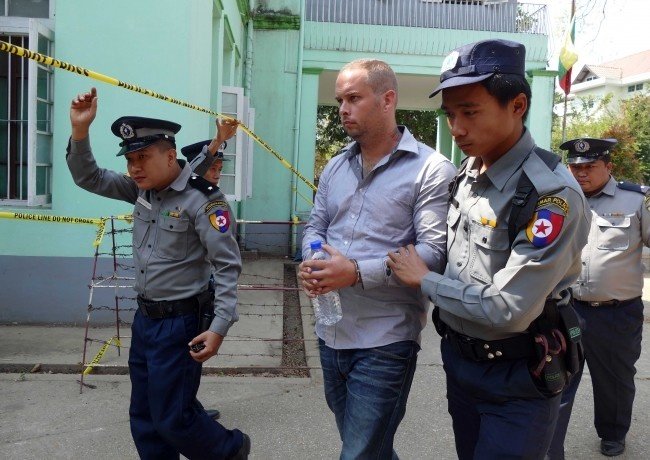
Last Month in Parliament
This month’s edition is out and has everything Burma related that was raised in the British Parliament last month.
At the TUC
At the Trades Union Conference in Brighton, where hundreds of union delegates are writing messages of solidarity for Naing Htay Lwin and Myo Min Min – Trade Union leaders in Burma who were arrested just for asking for a pay rise of $1 a day for garment workers. Take action here to help free them.
Emily Butler and Wai Hnin Pwint Thon from Burma Campaign UK with Frances O’Grady, TUC General Secretary
Army chief skips peace talks for Israeli military dealings
In Irrawaddy News:
“Burma currently has better relations with neighbouring countries than at any time it its history,” said Mark Farmaner of Burma Campaign UK. “Any weapons Min Aung Hlaing is considering buying from Israel must be for use in ethnic states. That Min Aung Hlaing chose to go shopping for weapons for use against ethnic groups instead of attending peace talks says a lot how genuine this peace process is.”
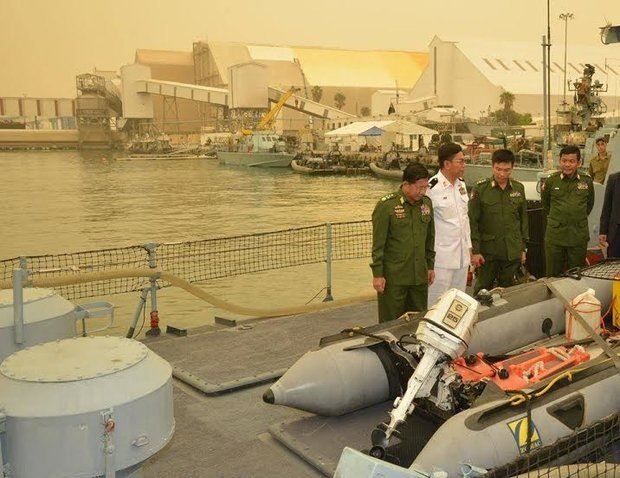
UK Firm Withdraws Application to Explore Jade Area
Irrawaddy News reporting on London-based firm Aurasian Minerals Plc withdrawing its three applications for mineral exploration licenses to Burmese mining authorities, less than a year after submitting the applications.
Mark Farmaner, director of the Burma Campaign UK, said that the firm appeared to have sought exploration licenses in Burma without appreciating the implications of the country’s ongoing ethnic conflicts.
“Aurasian should never have put in these applications with the Burmese government. They appear to be in conflict zones and without any consultation with local people,” he told The Irrawaddy.
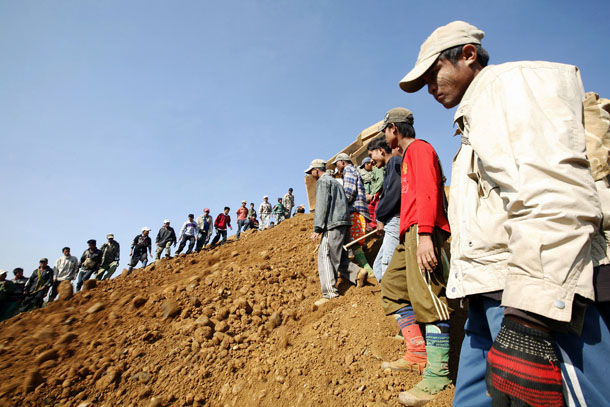
Drop the Charges against Andy Hall
Andy Hall is a researcher who defends the rights of migrants in Thailand, including migrants from Burma.
In 2013 he was involved in exposing how a factory in Thailand was committing human rights abuses against migrant workers in its factory. Abuses included child labour, workers being beaten, being paid illegally low wages and facing dangerous working conditions.
Instead of the company, Natural Fruit, taking action to stop these abuses, it has launched several legal cases for defamation and computer crimes against Andy Hall. If convicted he could face more than eight years in jail and a fine of more than eight million pounds.
The government of Thailand should be enforcing the law to stop abuses like this. They should be telling Natural Fruit to drop these cases and clean up its act. Instead they have been supporting the prosecution, appealing against a court decision to dismiss one of the cases.
These cases are an attack on free speech, and threaten work to improve the rights of migrant workers in Thailand, millions of whom are from Burma.
The Khin Nyunt-isation of Shwe Mann
Article by Mark Farmaner, Director at Burma Campaign UK, in Mizzima
Until his downfall in 2004, Khin Nyunt had been head of military intelligence as well as holding various other posts. He was a brutal man, Myanmar’s torturer-in-chief, responsible for monitoring and arresting activists. He was a staunch defender of the dictatorship, both as a man willing to crush any resistance internally, and defending the regime internationally.But at the same time, unlike many of his colleagues in senior positions in the regime, he was willing to engage with the international community. For diplomats frozen out from access to anyone senior in the regime, Khin Nyunt was a godsend. He was also smart enough to use the kind of language diplomats wanted to hear. He promoted the false narrative of internal struggles within the regime, battles between hardliner and reformers, framing himself as being in the reformer camp.
When he was arrested in 2004, some of the media reported the event as being a setback for reformers inside the regime. Some diplomats said the same.
Following Khin Nyunt’s arrest in 2004, officially for corruption, in reality due to internal power struggles, a handful of diplomats and UN officials in Myanmar began using his downfall to promote their own political agenda in Myanmar. Going against the policies of the governments they were supposed to represent, they wanted to end sanctions and other pressure, and use international aid to reach out to mythical reformers within the regime. They promoted a narrative that Khin Nyunt had been removed because he was a reformer. They said should have been supported by the international community. They claimed that he had reached out and tried to change things, but the response from the international community had been more sanctions, more criticism. (Without pointing out some of these sanctions were in response to the Depayin massacre where an attempt was made to kill Aung San Suu Kyi, and where many NLD supporters were killed).
They argued that if Khin Nyunt had been rewarded by relaxing international pressure instead of increasing it, he would have been able to demonstrate that reforms bring benefits and this would strengthen the hand of the reformers within the regime.
Not all diplomats were fooled though. As U.S. diplomatic cable from August 2005, released by Wikileaks, stated, “The hypothesis being that the disgraced prime minister was a moderate or a reformer who lost out to the hard-liners in a power struggle … General Khin Nyunt was a hard-liner, albeit a more polished and approachable one. He was a pragmatist who cultivated foreign countries and a purported dialogue with the opposition simply as a means to mollify the international community and perpetuate the regime’s absolute control.”
Nevertheless, this small group of diplomats continued pushing the false narrative of Khin Nyunt being a reformer, and of an opportunity lost. Sanctions and pressure had not promoted change, they claimed, it had undermined prospects for change. They persuaded other officials, academics and journalists that this is what had happened. A completely false version of history became accepted reality for many.
When Thein Sein began his reforms, remarkably similar in style to those of Khin Nyunt, but much grander in scale, these diplomats and their followers were back on the scene. Most were wearing different hats, but their story was the same. Don’t make the same mistake as with Khin Nyunt they argued. Seize this moment, back the reforms. For government ministers and international officials, with no knowledge of the true history, they sounded credible. They had more than a decade’s experience of Myanmar. Their arguments were persuasive. It provided decision makers with a helpful rationale for endorsing the reforms and dropping sanctions, which for various other political and economic reasons, they wanted to do anyway. The Khin Nyunt ‘lost opportunity’ narrative gave them what appeared to be a credible justification for rushing to endorse the reform process, despite many concerns about how genuine it was. Those arguing for more caution before relaxing pressure could be dismissed as not understanding the complexities.
Thein Sein achieved what Khin Nyunt could not. Almost all sanctions have been lifted, aid and trade is flowing, Myanmar is no longer a pariah state, and the military are still in control. When those goals were achieved, reforms slowed, then went into reverse. Thein Sein, like Khin Nyunt, is no believer in democracy.
Yet despite repeatedly being proved wrong, the hardliners versus reformer narrative still lives on. Its new reincarnation is Shwe Mann. Like Khin Nyunt, he was directly involved in human rights violations. He won his Thura medal for his time in Karen State, where soldiers under his command committed war crimes. Also like Khin Nyunt, he was adept at reaching out to the international community to present himself as a reformer.
He is being presented as having strengthened the influence of Parliament, but if this did happen, it was only because he used Parliament to try to promote his own influence. His closeness to Aung San Suu Kyi was a strategic calculation for his own personal ambitions, not because he believes in democracy and human rights. He is praised for supporting proposals to remove the Parliamentary military veto from the Constitution, but he knew full well it would not pass. The vote was about positioning himself for after the next election, when Parliament is likely to have an NLD majority.
Media headlines and comment articles describe his downfall as being a ‘setback’ or ‘blow’ to reforms. This ignores not only his history, but also his actions as Speaker, ranging from his blocking ratification of the convention against torture, to his recent support for banning media from observing Parliament.
The battle between Thein Sein and Shwe Mann is not about a difference in policy. It is about two former generals who want to be President. Thein Sein used to be presented as a reformer struggling against hardliners, now the same is starting to be said about Shwe Mann. This narrative was wrong about Khin Nyunt, it was wrong about Thein Sein, and it’s wrong about Shwe Mann. It has contributed to the international community making serious mistakes in its approach to Myanmar, mistakes which have helped perpetuate military control and human rights abuses. It’s time to move on from this false and simplistic narrative.

